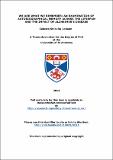Files in this item
We are what we remember : an examination of autobiographical memory across the lifespan and the impact of Alzheimer’s disease
Item metadata
| dc.contributor.advisor | Astell, Arlene | |
| dc.contributor.advisor | Dritschel, Barbara | |
| dc.contributor.author | Lonson, Celeste Shin-Ru | |
| dc.coverage.spatial | xiii, 228 | en_US |
| dc.date.accessioned | 2015-04-30T15:27:41Z | |
| dc.date.available | 2015-04-30T15:27:41Z | |
| dc.date.issued | 2014-10 | |
| dc.identifier.uri | https://hdl.handle.net/10023/6611 | |
| dc.description.abstract | “If you could somehow reprogram a person’s brain and change a significant memory in someone’s life, would that individual become someone else entirely?” According to McAdams (1985), a loss of autobiographical memory (AM) can be seen as a loss of identity, as identity is based on our personal experiences. As it is not currently possible to target and then alter specific memories within an individual brain, the AM of a healthy older group were compared to a group with Alzheimer’s disease (AD). The main question of this thesis was, “does a loss in AM result in a loss of identity?” This thesis explores AM across the life course through a series of four experiments with young and older adults, including a group with AD. Results support the critical role of the working-self in determining the self-relevance of AM across the lifespan. | en_US |
| dc.language.iso | en | en_US |
| dc.publisher | University of St Andrews | |
| dc.subject.lcc | BF378.A87L7 | en_US |
| dc.subject.lcsh | Alzheimer’s disease | en_US |
| dc.subject.lcsh | Autobiographical memory | en_US |
| dc.title | We are what we remember : an examination of autobiographical memory across the lifespan and the impact of Alzheimer’s disease | en_US |
| dc.type | Thesis | en_US |
| dc.type.qualificationlevel | Doctoral | en_US |
| dc.type.qualificationname | PhD Doctor of Philosophy | en_US |
| dc.publisher.institution | The University of St Andrews | en_US |
This item appears in the following Collection(s)
Items in the St Andrews Research Repository are protected by copyright, with all rights reserved, unless otherwise indicated.

